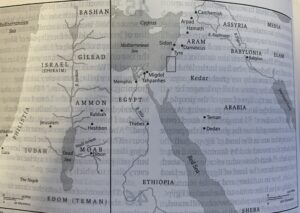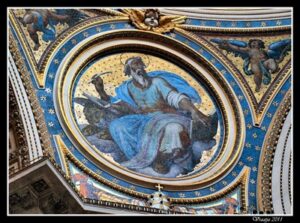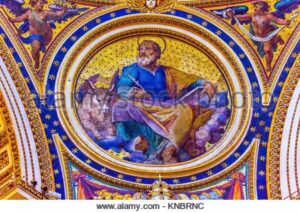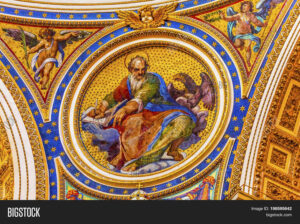Bible Reading Challenge Blog
October 20, 2020: Day 59 – Ezekiel 7
October 29, 2020This is a very direct and powerful oracle against Israel, even to the point where it states that the home of the Lord, which would be the temple, would be filled with the violent and they will profane it. You can see this in vs.22 where the prophet says God calls the temple his: “treasured place” which can also be translated as “secret place”.
You know that song his eye is on the sparrow, right? I love that song primarily because it was one of my favorites when we were in Russia because there was a guy names Sydney in our choir who could sing it and there wouldn’t be a dry eye in the place. Sydney, a refugee from Liberia, actually came and worshipped with us a few times here in Strasburg. But look at vs.4 where we read the Lord say that “my eye will not spare you, I will have no pity. I will punish you for your ways.” That is quite a bit different from the song that we have below.
But that tends to be the direction that Ezekiel takes us, at least in the beginning of this book of the Bible. Israel has crossed the line, they have worshipped other gods, and they have relied upon their wealth to provide them with security. God does not take kindly to that. A lesson for any of us who might be worshipping other gods or find refuge in our wealth.
October 19, 2020: Day 58 – Ezekiel 6
October 27, 2020It may seem a bit strange that God is going to lay to waste the mountains of Israel, the hills, the ravines and the valleys. Why? What did they do? How are they to blame for anything. So keep in mind that we know that in those places is where all of the rituals to the false gods would have taken place, even human and child sacrifices were seen as taking place on the mountains, the hills, the ravines, and the valleys. If you read vs.5 you will see God tells Ezekiel: I will lay the corpses of the people of Israel in front of their idols, and I will scatter your bones around your altars.
He ends this chapter by stating that: “Then they shall know that I am the Lord.” What will it take to turn the people away from their evil deeds to a recognition that God is Lord and ruler of all of our lives? Sometimes it takes the destruction of that which we believe is innocent and has had no hand in the atrocities that we see around us. The mountains, the hills, the ravines and the valleys were created by God and yet they will also be destroyed by God so that: They shall know that I am the Lord. What will it take to get our attention?
October 18, 2020: Day 57 – Ezekiel 5
October 27, 2020Now we have what I consider a more or less normal object lesson that Ezekiel is commanded to give to the people of Israel. He is to shave his hair from his head to also his face and use it in three different ways. Each way represents how the people of Israel have been either taken away in to captivity into Babylon, or killed within Jerusalem because they rebelled and fought back, or were simply left behind by the Babylonians because they were either too poor or too weak to be of any use to them.
If you look at the words starting in vs. 17 you read that God will send a famine against the people and specifically against “your children.” This famine will rob the people of Israel of their children which would have been their most precious, and in their captivity, their only possession. Can you imagine? This sword which Ezekiel is called to brandish to shave his hair will be used to pass through the people and the nation of Israel because they have turned their back consistently on the Lord.
October 17, 2020: Day 56 – Ezekiel 4
October 27, 2020Once again Ezekiel is provided with an object lesson which he is to perform himself in the sight of all the people. He is to play with toy soldiers and toy people. If they had Legos he would have to build Jerusalem with them and put figures that were casting a siege on the city. Instead, he is to take a brick and pretend the brick is Jerusalem. He is to lie on his side for the same period of time that Israel was besieged which was 390 years, but he was to do one day per each year. Then he was to do the same thing for Judah and Jerusalem which was only 40 days which equated to 40 years.
God was going to tie him up in cords until his time was finished. He was to eat a select menu of bread which was to be cooked over human excrement. Wait, what? Yes, Ezekiel does actually object to this because God had commanded him not to allow anything unclean to enter his mouth, and this would disqualify him from that commandment. God sees his side of the argument and so moves to allow him to cook the bread on cow poop instead. Whew, that was close. Wait, cow poop? We move on.
October 16, 2020: Day 55 – Ezekiel 3
October 27, 2020Ezekiel is commanded to do a number of things and given a number of challenges as he is to go out and do God’s bidding. He is first commanded to eat the scroll that the Lord gives to him. I would interpret that as eating the word of God. This should remind us of Jeremiah’s calling in chapter 1:9 where we read: “Then the Lord put out his hand and touched my mouth; and the Lord said to me, ‘Now I have put my words in your mouth.” So Ezekiel also has the word of God put in his mouth at the very beginning of his ministry.
We will find Ezekiel a few times in a valley, and this is one time where he goes and is caught up in the whirlwind that is a part of God’s presence and as a result he has to rest for 7 days before he can catch his breath again. It is in this valley where Ezekiel receives the Spirit of God. You will find later probably what I consider the most powerful verses of Ezekiel, about 20 chapters later, that describe the Holy Spirit in a way that is very interactive and present. Ezekiel could be called the prophet of the Holy Spirit. I like it. I just thought of that.
Ezekiel is then bound by cords because God does not want him to wander among the unfaithful of Israel. But when God speaks again to him then he will be freed to perform the duties that God has placed upon him. Sometimes God binds us so that we are limited until we find ourselves experienced enough, or full enough of the Holy Spirit to be able to do the work of God.
October 15, 2020: Day 54 – Ezekiel 2
October 27, 2020We find that Ezekiel the prophet is on the ground because of the image that he saw which caused him to “fall on his face.” God speaks to him directly and sends him out to the people of Israel. Now, what I would love for you to do is substitute the word United States in vs.3. Here is how it would read: “Mortal, I am sending you to the people of the United States, to a nation of rebels who have rebelled against me; they and their ancestors have transgressed against me to this very day. The descendants are impudent and stubborn…” He is commanded to say to them that God is still speaking in their midst. That is pretty daunting.
He tells them not to be afraid of them, he is commanded to speak the words of God and not to be dismayed at their looks. He is commanded to speak God’s words whether they listen or not. But as far as Ezekiel is concerned, he is not to be rebellious like the people that he is sent to minister to are rebellious. He is to hold fast to whom he is in the sight of God. God then hands him a scroll.
I don’t know about you, but I find this extremely empowering and powerful. God sends us out to speak the Gospel regardless of the result of our speaking. God calls us to live out the Gospel, regardless of the result of our life. The responsibility to live and to speak is on us, the responsibility of the results are on God. What a breath of fresh air that is.
October 14, 2020: Day 53 – Ezekiel 1
October 27, 2020We find ourselves in a new book of the Bible, and the final book for this 100 Day Challenge. Ezekiel means in Hebrew: “God strengthens” Think about that as you begin reading this book, because some have seen it as somewhat problematic in that it is not a simple narrative with stories that astound us. It is much more metaphorical with many examples which had meaning in the centuries in which it was written, but those meanings may have eclipsed their utilities to us now these many years later. Ezekiel is considered the last of the three major prophets, with the others being Isaiah and Jeremiah (which we just saw).
Some background on Ezekiel. He was a refuge living in the camps of Babylon. Once again, just like Jeremiah, he is writing in the midst of the Babylonian captivity, but at the time later than Jeremiah was living. Let’s look at chapter 1
We find the calling of Ezekiel who describes himself as a priest, the son of Buzi as he was in the land of the Chaldeans (remember we said earlier that the term Chaldean is synonymous with the term Babylonian). Babylon was in the north of Israel. Below you will find a map which I had shared with you before. It is important to see it and understand the different countries that are represented there.

This creature which is depicted may not make any sense to you, but let’s try to figure some of its features out. There is a sense that these creatures depict those who are part of God’s heavenly reign. They each had faces of living creatures and the creatures are that of a human being, a lion, an ox, an eagle. See if these figures below rings a bell. Each of these is in a corner of the basilica in St. Peters in Rome and they represent the four Gospels. The lion represents Mark, the person represents Matthew, the ox represents Luke and the eagle represents John.




October 13, 2020: Day 52 – Jeremiah 52
October 27, 2020We find a synopsis of all that has taken place in the Babylonian captivity which is basically identical to the verses which we find in II Kings 24:18-25:21. If you read that again, as we already have together, it should sound familiar. Zedekiah is the last king of Judah and his reign ended tragically with his last sight being the death of his children before he had his eyes gouged out. There were other deportations mentioned into Babylon, which we touched upon in II Kings.
This is also a description of the assured destruction of the temple and the deportation not only of the people but of all the goods and items that were in the temple, probably including the ark of the covenant which Harrison Ford is still searching. Jehoiachin is mentioned as the king who cozied up to the Babylonians, just like Jeremiah told the people to do, and he was treated as royalty until his death.
There are times that we are called to fight against injustice. There are also times when we are called to accept our fate because what we are experiencing is a result of our own doing. There is a necessity to be able to distinguish when we are called to stand up against injustice, and when we are to take our lumps because we deserve what we are getting. I would guess that being able to distinguish between the two should not be very difficult. Think about it.
Israel was disobedient and so God allowed the Babylonians to conquer them. In our society there should be an opportunity to see those areas where people are historically downtrodden at no fault of their own. I would define that as an injustice which we ought to stand against. If we find ourselves in difficult times because of our own poor decisions, we deserve pity, but this is not an injustice. We are called to rally around all people for all situations and not to pick and choose whom we will have support and whom we will not.
This ends our time in Jeremiah. It has been quite a journey, and what I’m hearing from many of you, a difficult one. I think it is an important one as the people of Israel felt like God had abandoned them in a very difficult time in the life of the nation. We find ourselves in a difficult time in the life of the nation. But God has not, and never will, abandon us. Believe it!
October 12, 2020: Day 51 – Jeremiah 51
October 27, 2020Thus far are the words of Jeremiah. Chapter 51 contains many, many words. Thy are all directed, once again, to the destruction of Babylon and the reconciliation between God and the people of Israel as a result of that destruction. A portion of this chapter that really struck me, simply because maybe I have never read it before, is starting at vs.20 where we find the description of God being defined as a “club” that smashes all that which was an enemy to Israel, including horse and its rider, old man and boy, young man and the girl, shepherds and their flocks, farmers and their teams. Basically, no one in Babylon is innocent and is caught up in the destruction against them simply because they were opposed to Israel. God as a club has been my favorite metaphor for God…never.
The dénouement finds itself starting in vs.59 where we find the author, Jeremiah, once again with a very tangible metaphor of a scroll which is to be rolled up and thrown into the Euphrates. The scroll contained the oracle of the destruction of Babylon, and then the prophet is commanded to throw it into the Euphrates with a rock tied to it so that it would sink to the bottom like Babylon was about to sink to the bottom as well. These were the words of Jeremiah.
Now Jeremiah is seen historically as speaking prophecies both against Israel and Babylon. Without a doubt he is not seen as an ally of anyone except God. That is the way it should be.
October 11, 2020: Day 50 – Jeremiah 50
October 27, 2020So we are seeing a huge transition here from oracles against the nations that were both allies of Israel and her sworn enemies, to now an oracle on how this is all going to end. Babylon who was responsible for taking Israel into captivity and for conquering all of that region, now we have an oracle on how they are going to be brought to destruction. There is also a reference to Chaldea in this chapter. Keep in mind that Chaldea and Babylon are interchangeable, different names for the same nation.
As a result of the destruction of Babylon, the people of Israel will be able to wander back and inhabit once again the homeland. The arrogance and defiance of Babylon will directly result into God turning the tables on her and bringing back His people to the promised land.
Look at vs.44 where we have the image of God as a lion who comes and casts out those who have taken over the lands that the shepherds that God had placed in the land had fled. Now they are able to inhabit them once again. There is a Chris Tomlin song that I really like which somewhat speaks to this chapter.